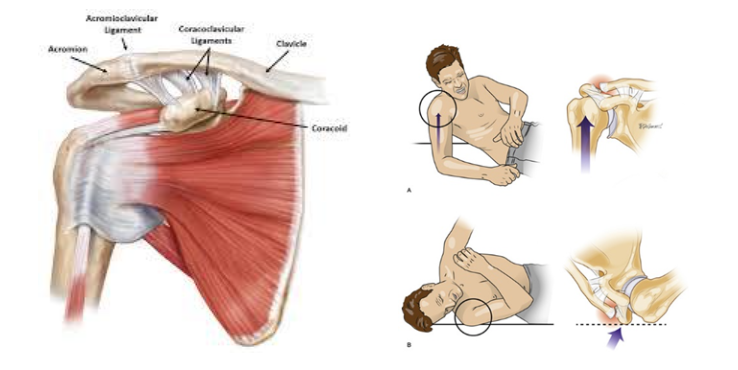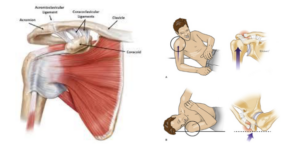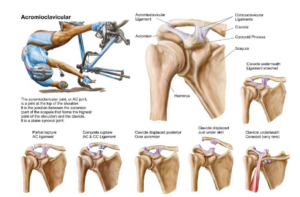
What is the AC joint?
It is a joint in the shoulder where the collar bone (clavicle) meets the acromion of the scapula. It is a plane type synovial joint. The AC joint allows a gliding movement, along with a small amount of axial rotation. As no muscle acts directly on the joint, all movements are passive, and are initiated by movement at other joints. The main ligaments that strengthen and stabilise this joint include the acromioclavicular and coracoclavicular (conoid and trapezoid ligaments).

AC joint injuries
Injury to the AC joint ligaments can occur as a result of a fall, direct blow, or other trauma. The rockwood classification of AC joint soft tissue injuries describes six different types/grades of injury.

What might an AC joint injury feel like?
You may experience pain at the AC joint on top of the shoulder, swelling, tightness, and a loss of motion. A noticeable bump on the shoulder can also form due to a full AC joint tear. Lifting the arm overhead, away from the body, or across the body will generally increase AC joint pain. Putting pressure on the shoulder, such as during sleep, intensifies pain.
How would an AC joint injury be diagnosed and what treatment should you have?
Your physio or athletic therapist will take a history and do some tests on your shoulder which may indicate AC joint injury. Depending on their assessment, they may recommend conservative management like hands on therapy and rehabilitation exercises. If it appears to be a very significant injury or rupture, you may be referred for an MRI and shoulder specialist review and may be advised to immobilise the shoulder temporarily. There is not currently good evidence showing that surgical intervention provides better outcomes than conservative management in AC dislocation so a rehabilitation/strengthening program will likely be your first step and focus (Tamaoki et al, 2019).
If YOU are concerned about a shoulder injury, we can help you! You can call us on 089-2133005 or book an appointment through our website.
Ref: